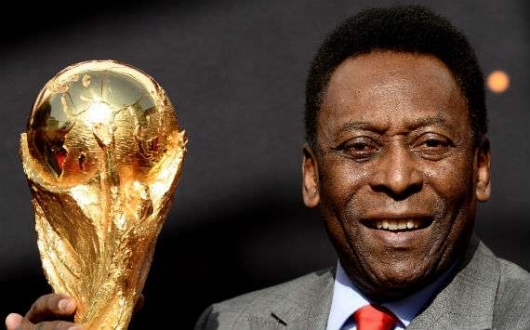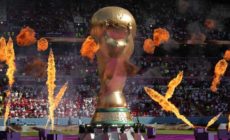“The political situation is difficult. The situation worries me,” he told German magazine Sport Bild. “There has been sufficient time to bring the stadiums to completion. It’s unacceptable. It’s a disgrace.”
Three stadiums — in Sao Paulo, Cuiaba and Curitiba — have not been completed. The Sao Paulo stadium is supposed to host the World Cup opener on Thursday, June 12 between Brazil and Croatia and World Cup organizers have already said that the match will be played in the unfinished Arena Corinthians — a planned roof over the stadium won’t be complete until after the tournament. A total of 12 stadiums have been commissioned for the World Cup, with half of them having been built for 2013’s Confederations Cup.
In addition to delays, World Cup stadium construction has been marred by worker deaths. Earlier this month, a worker in Sao Paulo was electrocuted and later died of a heart attack. It was the eighth documented death related to stadium construction. World Cup organizers have been adamant in saying that they haven’t compromised worker safety in order to get the stadiums built on time.
Still, in January, FIFA president Sepp Blatter criticized Brazil for beginning its World Cup preparations too late.
“It is the country which is the furthest behind since I’ve been at FIFA and moreover, it’s the only one that had so much time — seven years — to prepare itself,” he said.
And it’s not just stadiums that are incomplete. Planned upgrades to Brazil’s airports haven’t been completed, but government officials are assuring tourists that they won’t encounter problems when they arrive. Brazil’s Civil Aviation Minister, Wellington Moreira Franco, told the Associated Press that while some of the “work won’t be finished, all airports will be prepared to adequately” receive World Cup tourists. Planned subway lines are also still incomplete.
As for why there are so many delays, Pele — who is an advisor to the organizing committee — said he “blame(s) the evil people who have stolen all the money.”
Last year’s Confederations Cup was heavily protested, as Brazilians were irate over the country’s financial commitments to the Confederations and World Cups amid deteriorating social services, including free public transit. The World Cup alone is expected to cost north of $14.5 billion, and in two years, Brazil will host another multi-billion dollar sporting event — the 2016 Olympics.
Pele says he understands the public’s unrest, but says that the time for protesting has passed.
“People should have demonstrated when Brazil was chosen to organize the World Cup (in 2007), and not now that the World Cup is very soon,” he said. “The protests against the corruption at the construction sites are understandable — violence is not.”
Despite his disappointment, Pele says the corruption that has marred the first World Cup in Brazil since 1950, shouldn’t keep fans from rooting for Canarinho.
“Our national team has nothing to do with the existing corruption that has delayed the construction of the stadiums,” the three-time World Cup champ said. “I hop that Brazil will win the World Cup.”











 (Selorm) |
(Selorm) |  (Nana Kwesi)
(Nana Kwesi)